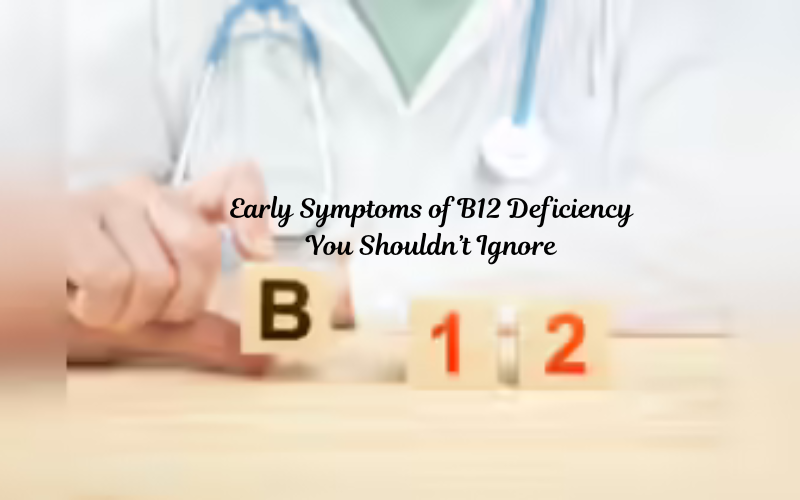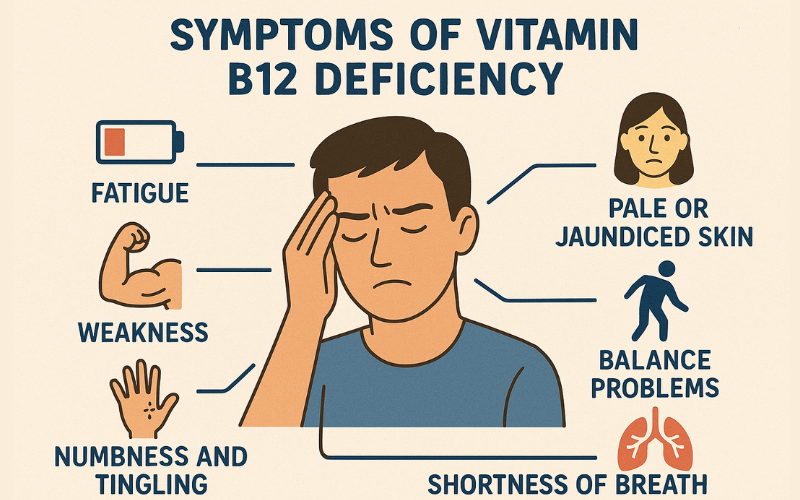Vitamin B12 plays a crucial role in energy production, brain function, and red blood cell formation. A deficiency can sneak up gradually and lead to serious health issues if ignored. This expert guide explores the early warning signs, neurological symptoms, and long-term effects of Vitamin B12 deficiency—so you can recognize it before it’s too late.
Table of Contents
What Is Vitamin B12 and Why Is It Important?
Vitamin B12, also known as cobalamin, is a water-soluble vitamin essential for multiple bodily functions.
Functions of B12 in the Body
- Supports red blood cell production
- Aids in DNA synthesis
- Maintains healthy nerve cells
- Crucial for cognitive performance and mood regulation
Daily Requirements and Absorption
Most adults need around 2.4 mcg per day, but your ability to absorb B12 depends on stomach acid and intrinsic factor—a protein produced by the stomach lining. Absorption becomes less efficient with age or in certain medical conditions.
Causes of Vitamin B12 Deficiency
A deficiency can occur due to insufficient intake, poor absorption, or medical conditions.
Poor Diet
People following vegan or vegetarian diets are at higher risk because B12 is found mainly in animal products (meat, eggs, dairy, fish).
Absorption Issues
- Pernicious anemia (autoimmune condition that blocks B12 absorption)
- Gastric bypass surgery or atrophic gastritis
- Inflammatory bowel disease (IBD) such as Crohn’s or celiac disease
Medications That Affect B12 Levels
- Metformin (used for type 2 diabetes)
- Proton pump inhibitors (PPIs) for acid reflux
Early Symptoms of B12 Deficiency You Shouldn’t Ignore

Vitamin B12 deficiency often begins with mild but persistent symptoms that may go unnoticed:
Fatigue and Weakness
The most common early sign. Without B12, your body struggles to produce red blood cells—leading to reduced oxygen transport and constant exhaustion.
Pale or Yellow Skin
Lack of red blood cell production may result in a pale appearance or jaundice (yellowish skin tone).
Mouth Ulcers or Glossitis
A swollen, smooth, or inflamed tongue (glossitis) and painful mouth ulcers are classic early indicators.
Dizziness or Shortness of Breath
These symptoms may occur even with mild activity due to reduced oxygen circulation.
Neurological and Cognitive Symptoms
B12 is essential for nerve health. As the deficiency worsens, neurological symptoms become more apparent.
Tingling or Numbness in Hands and Feet
Known as paresthesia, this pins-and-needles sensation occurs due to damaged nerves.
Balance and Coordination Issues
You may feel clumsy, have trouble walking straight, or experience frequent falls—especially in older adults.
Memory Problems and Confusion
B12 deficiency has been linked to brain fog, forgetfulness, and concentration difficulties.
Mood Changes: Depression, Irritability, Anxiety
Low B12 levels can disrupt neurotransmitters like serotonin and dopamine, leading to mood instability.
Severe or Long-Term B12 Deficiency Symptoms
If left untreated, B12 deficiency can cause irreversible damage.
Vision Problems
Damage to the optic nerve can lead to blurred or double vision.
Paranoia or Hallucinations
In extreme cases, neurological symptoms may mimic psychiatric conditions, such as paranoia or hallucinations.
Irreversible Nerve Damage
Prolonged deficiency may result in permanent nerve and spinal cord damage, impacting mobility and quality of life.
Risk Factors: Who Is Most at Risk of B12 Deficiency?

Certain groups are more vulnerable to developing low B12 levels:
Older Adults
With age, stomach acid production decreases, impairing B12 absorption.
Vegans and Vegetarians
Without supplementation or fortified foods, plant-based diets can lead to deficiency.
People with Digestive Disorders
Conditions like IBS, Crohn’s, or Celiac disease impair nutrient absorption.
People on Certain Medications
Long-term use of Metformin, antacids, or PPIs reduces absorption.
How Is Vitamin B12 Deficiency Diagnosed?
Common Lab Tests
- Serum B12 test: measures the level of B12 in your blood
- MMA (methylmalonic acid): elevated levels suggest deficiency
- Homocysteine: often high in B12 deficiency
When to See a Doctor
If you’re experiencing persistent fatigue, numbness, or cognitive changes, consult a doctor immediately. Early detection is key to preventing long-term effects.
Treatment Options for B12 Deficiency
Dietary Changes and B12-Rich Foods
- Animal liver (especially beef liver)
- Fish (salmon, tuna)
- Dairy and eggs
- Fortified cereals and plant-based milks
B12 Supplements and Injections
- Oral B12 supplements are effective for mild deficiency
- Intramuscular B12 injections are used in cases of malabsorption or severe deficiency
Monitoring and Follow-Up
Regular testing helps ensure B12 levels remain in the healthy range, especially for those on long-term medication or plant-based diets.
Preventing B12 Deficiency: What You Can Do
Nutrition Tips
- Eat a varied diet with B12-rich foods
- Choose fortified foods if you’re plant-based
- Consider a daily supplement if you’re over 50 or have absorption issues
Supplementation for At-Risk Groups
Vegan? Diabetic? Over 60? Consider taking methylcobalamin or cyanocobalamin supplements as preventive care.
FAQs About B12 Deficiency Symptoms
Q: How long does it take to correct B12 deficiency?
Improvement often starts within a few days to weeks after treatment begins, though nerve symptoms may take longer to resolve.
Q: Can symptoms be reversed?
Early symptoms are typically reversible. Neurological damage may become permanent if not addressed promptly.
Q: Is fatigue always caused by low B12?
Not always—fatigue can stem from iron deficiency, thyroid issues, or stress. A proper blood test is essential for diagnosis.
Final Thoughts: Don’t Ignore the Signs of B12 Deficiency
Vitamin B12 deficiency is common, treatable, and often overlooked—but the consequences can be serious if ignored. From fatigue to memory loss and nerve damage, symptoms can escalate quickly. The good news? With early detection, proper supplementation, and informed lifestyle changes, recovery is possible and often swift.
If you suspect a deficiency, talk to your doctor and request a blood test—it’s a small step that could prevent major health issues.
Looking for high-quality vitamin B12 tablets and other nutritional supplements? Visit Nutritional World for trusted products that support your health from the inside out. Start feeling better today—with the right nutrients, you can thrive every day.


























